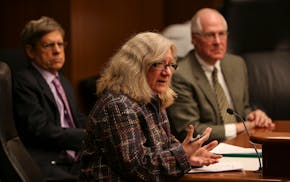Opinion editor's note: Strib Voices publishes a mix of commentary online and in print each day. To contribute, click here.
•••
The state's world-class medical center was name-checked at least twice during the recent vice-presidential debate, and with good reason.
Mayo Clinic is a key reason Minnesota is a global epicenter for medical care and research. Gov. Tim Walz understandably included the Rochester-based health system as he touted the good life in his home state when squaring off against Republican JD Vance on Oct. 1.
Regrettably, Walz missed a chance to go a step further and issue a challenge that could have better informed voters on a serious matter — the candidates' health — before ballots are cast on Nov. 5. Walz should have invited Vance and the two presidential candidates, Donald Trump and Kamala Harris, to join him and experience Mayo in person by checking in for a thorough medical examination.
Leading this nation for the next four years will require stamina both physical and mental. Having each candidate go through Mayo's Executive Health Program, or an expedited version of it, and publicly releasing key findings would provide assurance that the four candidates are ready for the rigors of serving as president and vice president.
These positions may well be the world's toughest jobs. There should be no question about the fitness of those seeking these positions. Mayo Clinic's assessment would be credible and insightful, though another reputable medical center's analysis would be helpful as well.
Unfortunately, it's unclear whether voters will be able to weigh candidates' detailed medical records this election year. While presidential contenders have historically released the information voluntarily, the New York Times is reporting that neither Trump nor Harris has released sufficient personal medical data. It doesn't appear that Vance or Walz has, either.
There's no requirement that candidates provide this material, but the precedent is there for a reason. The information is valuable as millions of Americans decide whom to support. President Joe Biden's decision to not seek re-election after a disastrous June debate also put an understandable spotlight on candidates' age.
Biden, already the nation's oldest sitting president, would have been 82 at the start of his second term and 86 at the end of it. The questions about his readiness for another four years in the White House were fair. Stepping down was the right decision.
But Trump, 78, is just a few years younger than Biden. Born in June 1946, he would be 82 at the end of his second term. The same questions that Biden faced about his advanced age apply to Trump, and answers are in order.
Harris should release her records as well. She'll turn 60 this month, which would make her 64 at the end of her first term. That's not young, but it's also an age when many people are still in the workforce. Questions about her health are legitimate, but less intense than those that voters should be asking about Trump serving into his 80s. Nevertheless, Harris should undergo an exam at Mayo, or release records from medical visits she's had while serving as vice president. The same holds true for Vance (age 40) and Walz (age 60), who would be a heartbeat from the presidency if elected.
Trump's recent appearances underscore the importance of him specifically providing comprehensive health information from a credible medical provider. The bizarre references to sharks and electrocution pop up too frequently in speeches. The claim that kids go to school and get transgender surgery before returning home is false on its face.
"Confused, forgetful, incoherent or disconnected from reality" is how the New York Times summed up his appearances earlier this month. "He rambles, he repeats himself, he roams from thought to thought — some of them hard to understand, some of them unfinished, some of them factually fantastical ... he relishes 'a great day in Louisiana' after spending the day in Georgia."
In August, after the much younger Harris became the Democratic nominee, Trump vowed that he would "very gladly" make his medical records available. So where are they?
The New York Times has asked for them but reported earlier this month that Trump is "refusing to disclose even basic health information." The Trump campaign did provide a one-page letter from Dr. Ronny Jackson, a former White House physician, that described the bullet wound to Trump's ear from a recent assassination attempt and provided a recovery progress report.
Jackson, however, is now a highly partisan Republican member of Congress and has been demoted by the U.S. Navy for misconduct in his White House position. He also faces an Office of Congressional Ethics investigation for campaign funds misuse. He is no longer a credible medical source.
Minnesota's famed clinic or its campuses in Arizona or Florida (the latter a four-hour drive from Mar-a-Lago) would be hospitable stops for a medical review. So would Johns Hopkins, the Cleveland Clinic, the University of Minnesota, the Veterans Affairs health system or another respected academic health center.
While it's hard to get an appointment with today's reality of crowded clinics and a health workforce shortage, accommodations no doubt could be made quickly for four high-profile patients. There's no excuse for the public not to have the health information needed to determine which candidate is best fit to serve.

Fierce but compassionate mental health advocate will be missed
Burcum: 'Big Beautiful Bill' takes hatchet to health care
Burcum: 'Why would we make it harder to get help' for addiction?
!["Republicans want to overturn this newfound eligibility [for undocumented immigrants to enroll in MinnesotaCare], which was passed by DFL majorities i](https://arc.stimg.co/startribunemedia/XZLGO62KH5G6DHR55ER5IECZAY.jpg?h=91&w=145&fit=crop&bg=999&crop=faces)
Burcum: Don't rush the decision on undocumented immigrant health coverage


